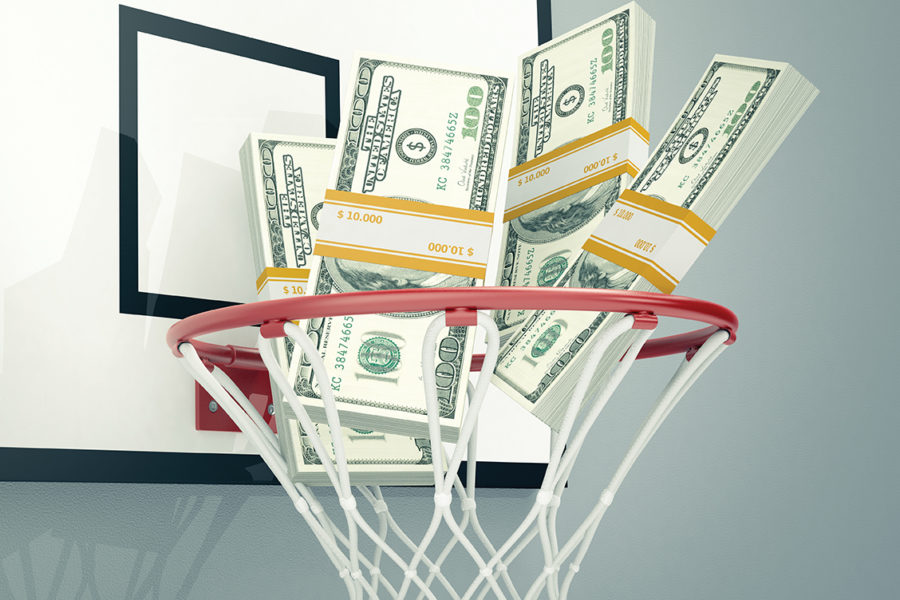
On the Up and Up
Mad Money on March Madness
March Madness has never been more aptly named.
This year, in addition to the plethora of traditional office pools and bracket bets among friends, countless area residents will be laying it all on the line and putting big money on the annual NCAA basketball tournament—only now, they’ll be gambling through official channels.
Last June, New Jersey became just the third state in the country behind Nevada and Delaware to legalize sports betting, while Pennsylvania soon followed with legislation of its own.
“I’m glad to see it,” said Brian Startare, a local sports media personality who has admittedly gambled his fair share of money on sports over the years. “It gives sports fans a new outlet.”
And while it’s no secret that sports fans have always opened up their wallets to wager on athletics, now, they can do so on the up-and-up.
“I like the fact that you don’t have to go through a bookie anymore to make a bet,” Startare said. “You can play the lottery, but you can’t bet on sports? I’ve always been of the opinion that taxpaying Americans can wager anything they want. There shouldn’t be regulation on that.”
For as excited as local sports fans are to add an extra dimension of rooting interest when they kick back to watch a game, the new legislation is a major boon for local casinos as well. They’ve already been cashing in on the new laws for a few months now, and are anticipating a huge rush of business to coincide with the NCAA tournament this March.
“I think the new legislation will continue having a positive impact,” said Steve Callender, the senior vice president of eastern regional operations for Eldorado Resorts, which owns the Tropicana Casino & Resort in Atlantic City. “It brings in new customers, especially the millennials who grew up playing fantasy sports and might not want to play slot machines or table games, but they’ll bet games. And there’s an existing market that will give people something else to do. We’ve been waiting a long time for this.”
“More people are going to be drawn to sports books, and that tournament is just going to be great,” added Startare. “That Thursday and Friday, the first two tournament days, are the best days of the year for a sports person, in my opinion. Now, it will only increase in popularity.”
To prepare for the upcoming madness, Tropicana opened a brand new sports book facility on March 8. The 5,000-square-foot William Hill Sports Book features 180 seats, eight total betting windows, and a large video display allowing guests to watch sixteen games at once.
“We are always looking to bring our guests more exciting experiences, and this new venue will bring a new level of fun and entertainment,” Callender said. “Sports betting has driven new business to the property, and the casino is busy all day long. Considering the popularity of the NCAA tournament, we expect to see the number of visitors grow exponentially.”
Now, local sports fans who would have needed to travel out west to enjoy legal sports gambling—or who would have turned to unscrupulous channels to place bets—can do so legally, right here at home.
“I know a couple that goes out to Vegas every year for the tournament, but people don’t have to go to Vegas now,” Startare said. “It’s a great thing for our state because the revenues are just going to be through the roof.”
A Slippery Slope
NCAA regulations prohibit student-athletes from wagering any money on any athletic competition, collegiate or otherwise. But now that sports betting is legal, there may be greater opportunities for those students to slip up.
“When you’re talking about athletic competition, and all of the sudden the outcomes are being wagered upon, it’s a very slippery slope now,” Startare said. “There’s an opening for impropriety.”
Considering the fact that college athletes are unpaid, the opportunities to make some immoral money may be tempting.
“Even though these athletes are getting a free ride, they don’t care about that, because they don’t really know the price of it,” Startare said. “All they know is they don’t have beer money, they don’t have car money, they don’t have money to spend. And the NCAA doesn’t allow them the opportunity to make money. People are going to start looking for shortcuts. All of the sudden, now, what’s an easy way to make money? Gamble.”
With that being said, Startare doesn’t feel the NCAA is at any greater risk for a scandal than it was before the new legislation.
“I think that anybody who is worried about the effect of point shaving, or kids being involved, I don’t think it will have any kind of negative effect like that,” he said. “That was already there. It’s been there from the beginning because people were betting on sports anyway. Now, it’s just intensified.”
Too many hands in the pot?
While Startare is in favor of the legislation to legalize sports gambling, he anticipates the big money legal sports betting will bring in could cause conflicts in the future.
“You want to find the root of any problem?” Startare asked. “Follow the money. Everyone is gonna try to find some way to make money off of it.”
The NCAA has vowed not to monetize the new legislation, citing concerns about the integrity of the game, but in practically the same breath, they announced a ten-year agreement with data and technology firm Genius Sports last May. Genius Sports offers cutting-edge software that captures statistics in real time—and one of their subsidiaries “offers services to betting operators in the United States and internationally, including a sportsbook management platform,” according to ESPN.
“I don’t believe the NCAA at all,” Startare said. “They’ll find a way to monetize it, just like everybody else will. And there’s not a problem with that, as long as they don’t lose their integrity.”
With so much money on the line, there’s bound to be more than a few instances of hypocrisy.
“They’re gonna keep Pete Rose out of the Hall of Fame, and now all of the sudden the commissioner of baseball is backing gambling?” Startare said incredulously. “I think this could open up a bevy of problems down the road.”

